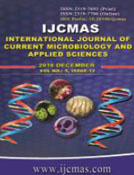


 National Academy of Agricultural Sciences (NAAS)
National Academy of Agricultural Sciences (NAAS)

|
PRINT ISSN : 2319-7692
Online ISSN : 2319-7706 Issues : 12 per year Publisher : Excellent Publishers Email : editorijcmas@gmail.com / submit@ijcmas.com Editor-in-chief: Dr.M.Prakash Index Copernicus ICV 2018: 95.39 NAAS RATING 2020: 5.38 |
The in vitro growth and development of potato plants are determined by a number of complex factors: the genetic make-up of the plant, nutrients: water, macro- and micro-elements, and sugars as well as physical growth factors: light, temperature, pH, O2 and CO2 concentrations and Some organic substances. Two potato cultivars namely, Santana and Innovator were used to study the effect of MS salt strength, gelling agent (agar and gelrite),calcium pantothenate as well as silver thiosulfate ( STS) and light intensity as physical growth factors on in vitro growth and development of potato meristem and shoot tip necrosis. There is no significant difference in plant length of two cultivars under different MS salt strength but the significantly effect was appeared in number of leaves at MS full salt strength. The opposite effect was occurred in root formation where 1/4 MS recorded the best result for root formation with significant difference among the treatments. Shoot tip necrosis was affected by MS salt strength, calcium pantothenate and STS. Nutrient medium supplemented with 2.5 g/l agar + 1g/l gelrite recorded the best growth for shoot formation estimated as plant length, shoot number and number of leaves as well as root number. The best medium for in vitro growth of potato cultivars ( Innovator and Santana) was MS basal medium at full salt strength solidified with 2.5 g/l agar + 1 g/l gelrite+ 2 mg/l cacium pantothenate + 0.5 mg / STS at 3000 Lux and 22 oC which reduced shoot tip necrosis and improved in vitro growth. Potato plantlets produced in vitro were transferred to plastic pots (6 cm diameter) filled with peat moss, perlite and washed sand at equal volume for acclimatization under controlled green house. The survival percentage was more 80% after four weeks and the survival potato plants were transferred to plastic pots (25 cm diameter )for more growth and mintuber formation where potato plants grow well in the greenhouse
 |
 |
 |
 |
 |